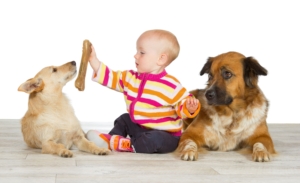Is Your Dog Jealous? How to recognize the symptoms and work to mitigate the behavior, BEFORE something bad happens!
As dog owners, we adore our pets and treat them as a part of the family. However, like all family members, dogs too can experience a myriad of emotions, including the complex feeling of jealousy. This article aims to delve into the intricacies of dog jealousy, providing insights into recognizing, managing, and mitigating this behavior.
Understanding Dog Jealousy
Jealousy, a human emotion, has been long attributed exclusively to our species. However, recent studies, such as those conducted at the University of California San Diego by Christine R. Harris and Caroline Prouvost (link at the bottom of the page), suggest that dogs may also experience a form of jealousy. Though it may not mirror human jealousy exactly, dogs can exhibit negative, even sometimes hostile, behaviors indicating their sense of a perceived social threat.
Recognizing Jealous Behavior in Dogs
Identifying jealousy in your pet involves observing their behavior in different situations, especially when other pets or humans are involved. Some common signs include:
- Trying to squeeze in between you and the object or person of their jealousy
- Growling, snapping, or exhibiting aggressive behavior
- Seeking extra attention by whining or nudging you
- Resource guarding food, toys, a favorite bed, or humans in the household
- Displaying disruptive behavior such as indoor accidents
It’s crucial to note that these behaviors might not always indicate jealousy; in fact, they might also be signs of discomfort, stress, or health issues. Therefore, always consult with an experienced Professional Trainer if you notice a sudden change in your dog’s behavior.
The Most Common Cause of Jealousy: A Shift in Routine
Dogs, like humans, are creatures of habit. They thrive on routine. Any significant alteration in their daily schedule can instigate feelings of instability in their pack and/or relationship with you, leading to jealousy. This might include a new pet or person in the house, moving to a new home, a shift in their feeding or walking schedule, or a change in their primary caregiver.
Dog-on-Dog Jealousy
Dogs can experience jealousy towards other dogs in their pack, especially if there is a newcomer to the household. This might manifest as resource guarding, aggression, dominance, or territorial behavior. It’s essential to manage this jealousy effectively to maintain a harmonious household.
Introducing a New Dog to the Pack
The introduction of a new dog to the pack can be a stressful event for your existing dog. Oftentimes, he or she may feel left-behind or downgraded in hierarchy; especially if human family members make a point out of spending more time with the new dog than the existing dog. Alleviate this tension by ensuring balanced affection and maintaining a semblance of routine. Additionally, taking the time for a slow introduction over days or weeks, before eventually introducing the dogs on neutral ground can help avoid territorial disputes.
Training Practices
Regular training can help address jealousy by reinforcing positive behaviors and boosting the idea in your dog’s mind that you care about them individually. Spending a few 30-minute training sessions with your dog a week, on top of daily moments of affection and positive interaction, can help establish your leadership in a positive way and manage jealousy situations much more effectively; possibly squashing them altogether!
Rewarding Good Behavior
Positive reinforcement, such as rewarding your dog when they display desired behavior, can be an effective strategy to manage jealousy. It’s important to redirect your dog’s jealous behaviors immediately when you see signs of a problem, and reward them only when they then behave appropriately and do what you have asked.
Dogs and Babies: A Special Case
Introducing a new baby to your dog can be a unique challenge, as dogs can often become jealous of the attention the baby receives. It’s essential to balance the attention given to both your new baby, as well as your dog, and to include your dog in the baby’s activities in a safe controlled manner as often as possible. For example, allowing the dog in the room while nursing, changing, or even rocking the baby while they cry – can all help your dog adjust to their new small human pack member and become better adjusted to their scent. However, NEVER leave a dog unattended with a baby, ever. You can’t stop behaviors you aren’t there to interrupt.
Addressing Territorial Behavior
A dog’s jealousy can sometimes escalate into territorial behavior, which can also include resource guarding items, favorite dog beds or areas outside, and even people. Training a territorial dog requires establishing that rewards come from you when they behave appropriately, as well as removing the dog’s ability to “own” the space or thing they feel they need to control/guard. Remove triggers wherever possible, such as loose toys, free-feed bowls, or bones, and reach out to a Trainer immediately. Very often, territorial behavior can also be the result of past trauma (which creates a very strong reaction when triggered; potentially putting people and other dogs at extreme risk).
Seeking Professional Help
If your dog’s jealousy becomes a significant issue, don’t hesitate to seek help from an experienced Professional Trainer that has a proven track record in working with insecurity and aggressive behavior. While psychosomatic issues are rarely curable in their entirety, your Trainer can provide valuable insights and training methods to address and mitigate the issue through management and relationship building.
Nurturing a Healthy Relationship
Managing dog jealousy effectively involves nurturing a healthy relationship between you and your dog, as well as between your dog and other pets or humans. It requires understanding, patience, dedication, and sometimes professional help. Remember, you’re not alone in this journey. You’re an amazing pet parent for recognizing and addressing your dog’s needs! Finally though, always remember, a small amount of managed jealousy is normal and a sign of your dog’s love and attachment to you!
Further Reading: Jealousy in Dogs by Christine R. Harris & Caroline Prouvost

